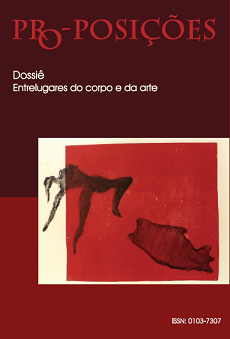Resumo
La capacidad creativa está íntimamente relacionada con las formas en que el cerebro procesa y archiva el lenguaje. Las metáforas y sus etimologías son nuestras huellas del pasado, el DNA de nuestro pensamiento. La neurociencia ha hecho descubrimientos relevantes acerca de cómo funciona nuestro cerebro lingüísticamente demostrando que toda persona utiliza un registro particular determinado por la oferta de metáforas que ha acumulado a lo largo de la vida orientando los caminos de su imaginación. La idea de que los conceptos están enraizados físicamente, contrasta con la idea del racionalismo que sostiene que los conceptos son abstracciones descorporizadas, completamente separadas del sistema motor sensorial. Esta nueva forma de ver el lenguaje, abre una nueva conceptualización del cuerpo humano. Integrando los hallazgos de la ciencia con la dimensión artística de las metáforas, damos un paso adelante para estimular un pensamiento y una visión poética en la educación.
Abstract:
Creative capacity is intimately related to the ways in which the brain processes and stores language. Metaphors and their etymologies are footprints of the past, the DNA of our thoughts. Recent findings in neuroscience concerning the way in which the brain works linguistically have shown that people make use of a particular register determined by the supply of metaphors that they have accumulated throughout their lives to guide their imaginative pathways. The idea that concepts are physically rooted contrasts with the idea of rationalism, which holds the statement that concepts are bodiless abstractions, completely separate from the sensory motor system. This new way of regarding language, therefore, gives rise to a new conceptualization of the human body. By putting the findings of science and the artistic dimensions of metaphors together, we take a step toward encouraging poetic seeing and thinking in education.
Key words: Creativity. Language. Body. Metaphor. Mind/brain
Referências
BEUCHOT, Maurício. Historia de la filosofía del lenguaje. México: FCE, 2005. 327p. (Colección Breviarios) BOMBINI, Gustavo. Prólogo. In: RÖNNER, María Adelia Díaz. Cara y cruz de la literatura infantil. Reedição. Lugar Editorial, 2001. Disponível em: http://www.imaginaria.com.ar/05/ 4/caraycruz.htm. Acesso em: 9 ago. 2009.
BOMBINI, Gustavo. Reinventar la enseñanza de la lengua y la literatura. Buenos Aires: Libros del Zorzal, 2006.
BORDELOIS, Ivonne. La palabra amenazada. Buenos Aires: Libros del Zorzal, 2005. [2003].
BORGES, Jorge Luis. This craft of verse. Massachusetts: Harvard University Press, 2000.
CUESTA, Carolina. Discutir sentidos. La lectura literaria en la escuela. Buenos Aires: Libros del Zorzal, 2006.
FERRER, Virginia. De Penélope a Antígona y viceversa: los desaprendizajes del profesorado para la complejidad educativa. In: SANTOS REGO, Miguel; GUILLAUMIN TOSTADO, Arturo (Ed.). Avances en complejidad y educación: teoría y práctica. Barcelona: Octaedro Educación, 2006.
FRUGONI, Sergio. Imaginación y escritura. Buenos Aires: Libros del Zorzal, 2006. 112 p.
GITTE, Kristiansen; ACHARD, Michel, et al. Cognitive linguistic. Current applications and future perspectives. Berlim: Mouton de Grouyter Reader, 2006. p. 369.
ITURRIOZ, Paola. Lenguas propias, lenguas ajenas. Buenos Aires: Editorial Zorzal, 2006. 112p.
JULLIEN, François. Detour and access strategies of meaning in China and Greece. Nova Iorque: Zone Books, 2000.
LAKOFF, G.; JOHNSON, M. Metaphors we live by. Chicago: University of Chicago Press, 1980.
LAKOFF, George. The political mind. A cognitive scientist's guide to your brain and its politics. Nova Iorque: Penguin, 2009. [2008].
MATURANA, Humberto; REZEPKA, Sima Nisis. Formación humana y capacitación. Santiago: Dolmen-Océano, 1997.
MEHLER, Jacques; DUPOUX, E. Nacer sabiendo. Introducción al desarrollo cognitivo del hombre. Madrid: Alianza Editorial, 1944.
MORIN, Edgar. La mente bien ordenada. Repensar la reforma. Reformar el pensamiento. Barcelona: Seix Barral, 2000.
NEGRIN, Marta. Gustavo Bombini. Los arrabales de la literatura. La historia de la enseñanza literaria en la escuela secundaria argentina (1860-1960). Buenos Aires: Miño y Dávila, 2004.
NIETZCHE, Federico. Sobre verdad y mentira en sentido extramoral, 1873. Disponível em: <http://www.lacavernadeplaton.com/articulosbis/verdadymentira.pdf>. Acesso em: 9 ago. 2009.
ORTONY, Andrew. Metaphors and thought. Cambridge: Cambridge University Press, 1978.
PACHECO, José Emilio. Reloj de arena: Borges de noche. Mexico D.F.: Letras Libres, 2001.
PAOLI BOLIO, José Antonio. Educación, autonomía y lekil kuxlejal: aproximaciones sociolingüísticas a la sabiduría de los tseltales. México DF: UAM-X; Comité de Derechos Humanos Fray Pedro Lorenzo de la Nada, A.C., 2003.
PRIMERO RIVAS, Luis Eduardo; BEUCHOT PUENTE, Mauricio. Hacia una pedagogía analógica de lo cotidiano. Ciudad de Mexico: Primero, 2006. (Colección Construcción Filosófica).
RICHARD, Ivor A.; OGDEN, C. K. The meaning of meaning: a study of the influence of language upon thought and of the science of symbolism. Londres: Kegan Paul, 1923.
SANTIAGO GUERVÓS, L. E. de. Metáfora vs. concepto: la generación de la metáfora en F. Nietzche. Estudios Filosóficos. v. 49, n. 141, p. 261-286, 2000. (citado por Beuchot en p. 160 de Historia de la filosofía del lenguaje).
SARDI, Valeria. Historia de la enseñanza de la lengua y la literatura. Buenos Aires: Libros del Zorzal, 2006. 128 p.
SCHÖN, D. Generative metaphor: a perspective on problem setting in social policy. In: ORTONY, A. (Ed.). Metaphor and thought. Cambridge: Cambridge University Press, 1978. p. 54.
SCHÖN, D. El profesional reflexivo. Cómo piensan los profesionales cuando actúan. Buenos Aires: Paidós, 1998.
TEDESCO, J. C.; PORTER, L. Políticas de subjetividad para la igualdad de oportunidades educativas. Un diálogo entre Juan Carlos Tedesco y Luis Porter. Revista Electrónica de Investigación Educativa, v. 8, n. 1. Disponível em: <http://redie.uabc.mx/vol8no1/contenidoporter2.html>. Acesso em: 27 ago. 2006
A Proposições utiliza a licença do Creative Commons (CC), preservando assim, a integridade dos artigos em ambiente de acesso aberto.

